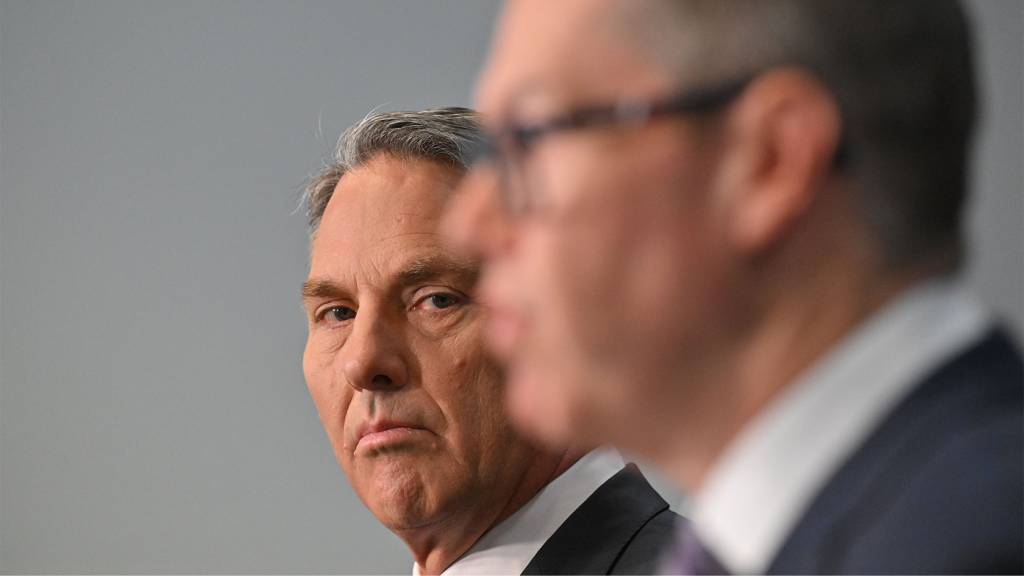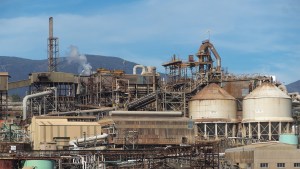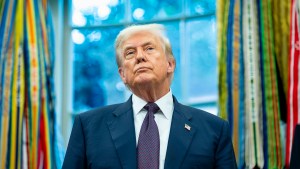Late last week, the US again told Australia it should increase defence spending to 3.5% of GDP — a different figure to the 3% urged in March, but one should never expect consistency from Donald Trump. How did America deliver its message? A letter between ministers? Communications between the Pentagon and Department of Defence officials? A speech by the acting US ambassador?
No, via News Corp. Trump’s Pentagon briefed staff at The Australian and directly linked the demand for increased spending to AUKUS: “It is vitally important that they are able to raise defence spending to 3.5% of GDP … we can say with confidence that if Australia does not raise defence spending, it is going to struggle to field the forces required to defend Australia but also to make good on its commitments to others.”
It’s not especially surprising that News Corp should be the chosen mechanism of delivery. It is a US company; it exists to serve the interests of its American owners. Like other large US companies, it also has a complex but ultimately dependent relationship with Trump. And it is not a media company, which might mean its Australian outlets undertake journalism and thus have some working concept of the public interest in the Australian context.
Related Article Block Placeholder
Article ID: 1216482
The inaptly named The Australian is more like a messenger service to transmit requests from the imperial capital to one of its frontier provinces. Moreover, it’s hardly the first time the national broadsheet has been used to convey Washington’s wrath that Australia is not spending enough money on defence (and, specifically, the American companies that benefit from such spending).
News Corp is hardly alone in acting in the interests of the US and its corporate interests in Australian defence policy. Recently, The Australian Financial Review carried a call by the chairman of Austal for more government spending in Henderson Shipyard in Western Australia as a mechanism for Australia to shore up AUKUS.
Independent. Irreverent. In your inbox
Get the headlines they don’t want you to read. Sign up to Crikey’s free newsletters for fearless reporting, sharp analysis, and a touch of chaos
By continuing, you agree to our Terms & Conditions and Privacy Policy.
Austal, the scandal-plagued shipbuilder now designated as “sovereign” by the government, stands to benefit directly from such spending. And who is its chairman? Richard V. Spencer, a former Marine, finance businessman, member of the Pentagon’s Defense Business Board and the first Trump administration’s secretary of defence.
The debate over defence and security is an artificial ecosystem in Australia in which US interests are always well-heard. The United States Studies Centre at the University of Sydney, which accepted funding from the first Trump administration in 2019, is headed by Michael Green, whom The Australian quotes in support of the Pentagon. Green served on the Bush administration’s National Security Council.
Another reliably hawkish participant in the defence and security debate, the Australian Strategic Policy Institute, draws heavily on funding from the US State Department, as well as from major US defence contractors like Raytheon and HII.
This foreign influence is on top of the reflexively pro-US bent of most former defence and security bureaucrats who populate the defence debate ecosystem, such as “Strategic Analysis Australia“, headed by veteran and unabashed neocon Peter Jennings. They operate as a vast copy-and-paste function for journalists, offering the same pro-US, pro-defence talking points whenever invited — which they are, very often, even by actual media outlets like the Nine newspapers.
Related Article Block Placeholder
Article ID: 1216562
Finding an informed opinion on defence spending that isn’t driven by direct or indirect self-interest — or an unthinking pro-Washington mindset — is thus difficult. And that’s in dire contrast to the fact that the US is now our economic enemy, one committed to undermining our trading environment and interfering in our domestic economic policies — such as the Pharmaceutical Benefits Scheme — while acting as the greatest source of global strategic and economic instability.
Peculiarly, this ecosystem of pro-US interests doesn’t seem to quite understand how good it has it currently: it has, in Anthony Albanese, the most rigidly pro-US defence prime minister Australia has ever seen. He has taken Morrison’s AUKUS project, doggedly pursued it and refused to contemplate a plan B for when the Americans and British inevitably can’t provide any submarines, while far exceeding Julia Gillard’s ambitions and integrating Australia ever more closely into US preparations for a war with China.
He has already committed to increasing defence spending to 2.33% of GDP. In Richard Marles, Albanese has the most pro-US defence minister in history, a man whose future on defence boards is his post-political life is guaranteed far more than his fantasies of the prime ministership.
To portray Albanese and Marles as Whitlamite opponents of US interests and dovish softies gulled by China — especially when it is the United States that is the biggest economic threat to Australia — is unparalleled chutzpah from American interests in Australia. But there are few out there to call them out on it.
Is Anthony Albanese the most pro-US PM ever?
We want to hear from you. Write to us at letters@crikey.com.au to be published in Crikey. Please include your full name. We reserve the right to edit for length and clarity.



